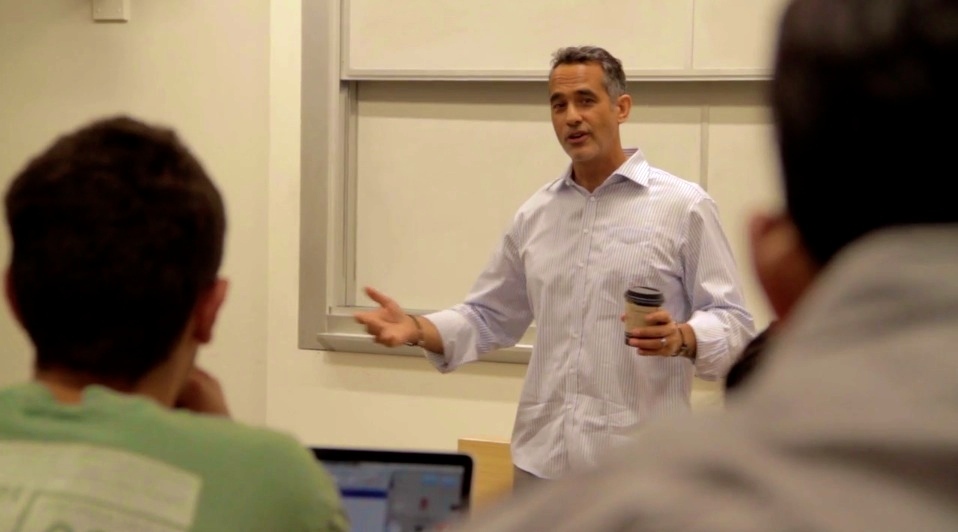Stanford Course Captures ‘The Spirit of Entrepreneurship’

The course MS&E 178, called “The Spirit of Entrepreneurship,” allows students to get up close and have candid conversations with accomplished startup founders, venture capitalists and other thought leaders from around the country. These practitioners discuss their failures and triumphs and the lessons they now live by — sharing their experiences and insights in a way that is unique even at Stanford.
In other words, students get to be in a room with some of today’s most passionate players in the entrepreneurial ecosystem and ask them how they got to where they are, and what challenges they faced along the way. The course, offered in Stanford’s Department of Management Science & Engineering, is open to undergraduates and graduate students from across the university and has featured iconic figures such as Melinda Gates and Jack Dorsey.
Why call it “The Spirit of Entrepreneurship”? It depends on which instructor you ask. Silicon Valley veterans Heidi Roizen, Ravi Belani and Toby Corey take turns teaching the course each quarter and bring unique perspectives. But they all agree that, fundamentally, the course strives to capture and convey the essence of entrepreneurship through the real-life stories of innovators across the space.
For those students with a sincere curiosity about entrepreneurship, and a willingness to participate — and shape — class discussions, the course can literally redefine how they see the world.
“If you want to take a class that’s going to completely change the way you look at your career and your education — both in and outside of the classroom — then you want to take this course,” said Wade Morgan, a political science major who took the course as a junior in Spring 2014. “This is one of those classes that can really just fundamentally change who you are as a person, for the better.”
Each week, the instructor sends students a set of questions about the upcoming speaker. As part of their grade, each student must then write a thoughtful blog post in response to one of the questions. More importantly, the regular assignments prepare students to come up with meaningful queries for the Wednesday class.
The biggest percentage of a student’s grade (40 percent) is based on participation. The course’s impact depends largely on the quality of the in-class discussions — and whether the questions and comments extract the profound and personal insights of these uniquely accomplished professionals.
“I really believe that the student coming out of ‘The Spirit of Entrepreneurship’ is going to know if starting a company is really for them,” said Roizen, a Silicon Valley native who has spent her career as an entrepreneur, investor and now operating partner at the venture-capital firm DFJ. “And it’s really going to help that student also understand, as they leave Stanford, do they want be involved in a small company? Do they want to be involved in a large company? If a large company, how do they bring entrepreneurial thinking to it?”
The course’s guest speakers are the featured presenters in the weekly Entrepreneurial Thought Leaders Seminar, the popular series followed around the world via Stanford’s ECorner. Recently, the class has welcomed venture capitalist Tim Draper, tech sage Tim O’Reilly, Endeavor CEO and Co-Founder Linda Rottenberg and Khan Academy Founder Sal Khan.
“Something that really struck me was the degree of authenticity that these very successful and influential entrepreneurs had — and they all had really nuanced stories,” said undergraduate student Stephany Yong, a symbolic systems major who also took the course last spring. “This class definitely opened my eyes to how much entrepreneurship is a lot more than just startups. It’s about that mindset.”
Beyond a mindset, entrepreneurship is “multidimensional,” according to Toby Corey, MS&E 178’s spring quarter instructor. As he likes to put it, “entrepreneurship is a universe wide and a universe deep.” And he should know. Like Roizen, Corey has worked in all facets of tech: starting out as a software test engineer and project manager at a large company, Corey later served as a vice president at Novell.
His biggest entrepreneurial splash was co-founding and leading a web-development firm in 1995 that grew from two people to more than 5,000 employees over the course of four years. When USWeb went public, it was the largest company of its kind — with $1 billion in annualized revenues.
“There’s no greater opportunity to learn than literally sitting down and being able to ask a question,” Corey said, “and then having that successful entrepreneur answer you.”
Fall quarter instructor Ravi Belani said, back when he was an undergraduate at Stanford, there were few Indians in venture capital. He nonetheless dove into the valley’s startup scene as a venture capitalist, stressing that students now have the benefit of seeing people they can relate to because “The Spirit of Entrepreneurship” features such a diverse array of speakers.
“Seeing someone who you can reflect upon, a person who was just like you, and seeing that they’ve changed the world, can be incredibly expansive in terms of what you know is possible,” said Belani, who now runs the tech-venture accelerator Alchemist.
Stanford alumna Aditi Maliwal took MS&E 178 her senior year as a psychology major. She previously spent a summer working on Deutsch Bank’s technology-investment team. The experience set the trajectory of her career after Stanford. But at the time, it also limited her ability to understand the entrepreneurial side of the many tech companies she encountered.
Maliwal wanted to learn how these companies built themselves and know their growth strategies. Taking the course allowed her to understand startups from the perspectives of engineers and business professionals alike, which then fueled her as she continued along her career path in venture capital and freed her to see it as no less entrepreneurial than that of a startup founder.
“I will be entrepreneurial in the path that I take and continue on in venture capital,” said Maliwal, who now works at the firm Crosslink Capital. “The best part about taking this class is that it allowed you to expand the definition of what entrepreneurship is.”
That’s exactly what the course’s instructors and creators want to hear. MS&E 178 was developed by the Stanford Technology Ventures Program, the entrepreneurship center in the university’s School of Engineering. And one of STVP’s main goals is to bring the entrepreneurial mindset to every student at Stanford.
“It’s about going after something even if you don’t have the physical resources to do it; and your currency, then, is your spirit. That’s why we call it ‘The Spirit of Entrepreneurship,’” said Belani, who considers entrepreneurship no less than one’s “highest calling” in life.
“It’s about cultivating what’s unique within you to change the world,” Belani explained. “All human beings are inherently creative, inherently innovative and need to be entrepreneurs in whatever facet makes sense within the context of their life.”



